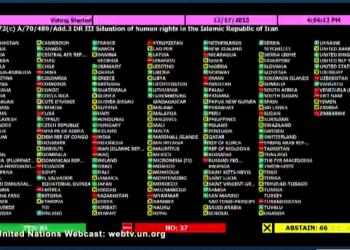Ongoing human rights violations in Iran spotlighted in UN vote
Last month, Iranian authorities arrested 20 Baha’is and closed 28 of their shops. Today the UN expressed “serious concern” about such religious discrimination in Iran, along with other continuing human rights violations.
By a vote of 81 to 37 with 67 abstentions, the UN General Assembly approved a resolution addressing the overall human rights situation in Iran, expressing concern not only about religious persecution but also the government’s frequent use of the death penalty, failure to uphold legal due process, restrictions on freedom of expression, and ongoing discrimination against women and ethnic minorities.
“We welcome this resolution,” said Bani Dugal, the principal representative of the Baha’i International Community to the United Nations. “It shows that the international community remains aware and concerned about Iran’s continued violations of the rights of its citizens in a wide range of areas, despite government rhetoric to the contrary and its promises to improve.
“Certainly for Iranian Baha’is, the government’s policy of systematic and widespread persecution remains unchanged. Just last month, as the General Assembly was considering this resolution, Iranian authorities arrested 20 Baha’is in three cities, while also closing at least 28 Baha’i businesses in another six cities. Such actions demonstrate the wide ranging and centrally directed nature of its anti-Baha’i program,” said Ms. Dugal.
Among other things, the resolution expresses “serious concern” about “ongoing severe limitations and restrictions on the right to freedom of thought, conscience, religion or belief.”
It also urges the government to release the seven imprisoned Baha’i leaders, and “to eliminate, in law and in practice, all forms of discrimination, including the closure of businesses, and other human rights violations against persons belonging to recognized and unrecognized religious minorities.”
The resolution was put forward by Canada and co-sponsored by 44 other countries. It follows reports on human rights in Iran by Ahmed Shaheed, the Special Rapporteur on human rights in Iran and UN Secretary General Ban Ki-moon, who both delineated numerous examples of Iran’s continued violations of international human rights law.
